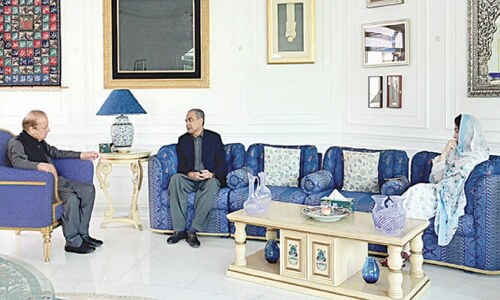KARACHI: “The dichotomy of this country is that it prides itself on more becoming a democratic state, yet various forms of slavery still exist within its borders,” says Dr Ghulam Haider, who works at the Green Rural Development Organisation (GRDO) that aims to free bonded labourers.
Trade union leaders, representatives of farmers bodies and civil society activists came together at the Karachi Press Club on Sunday to launch a campaign to end bonded labour in Sindh, highlighting how deeply engrained the problem has become in the rural areas of the province.
Dr Haider said the inhuman practice was rampant in the agriculture industry, in brick kilns and fisheries, and shared many examples of the plight of labourers, who were being mercilessly exploited by influential landlords “committing atrocities against these vulnerable communities”.
The GRDO has initiated a campaign all over Sindh to end bonded labour. It plans to stage protests and demonstrations, camps and sit-ins in different parts of the province to highlight the issue.
According to Dr Haider, over 2.3 million people are facing bonded labour, with over 80 per cent of them being Hindus.
He spoke about the Bonded Labour Abolition Act 1992 which, he said, was not being implemented rigorously in Pakistan, and as a result “Pakistan has become the third highest bonded labour-infected country in the world”.
Habibuddin Junaidi, convener of the Sindh Labour Solidarity Committee, said: “Good governance is the way forward. Laws are present, but not enforced which has resulted in this social evil flourishing.
“There is no political will to curb human rights violations that take place against bonded labourers. Influential landlords do not pay dues to the share-croppers and peasant labourers and instead resort to violation in case a labourer demands his rights. In some instances, landlords have even lodged fake cases against peasants who demanded their due share,” he said.
Dr Haider explained how his organisation started proceedings to free bonded labourers and said they approached the landowners first. If negotiations with them proved futile then they would approach a district session court and file a petition for the release of the labourers. “It is only then that the court orders the police to free the labourers from the clutches of the landowners,” he said.
Raju, a female peasant from Sanghar, shared a similar story. She was freed from bonded labour in 1998 with the help of the Human Rights Commission of Pakistan and ever since she has been working to release others from this form of modern slavery.
Her frustration at the apathy of people to the issue of bonded labour was apparent. Her story had a happy ending when she was freed, but not everyone else’s in her situation does.
She shared tales of back-breaking workload, non-payment by land-owners, lack of food, and rampant physical and sexual abuse. The children of bonded labourers are also not free and remain under the control of the landowners indefinitely.
One important demand of the campaign is timely payment to the labourer, especially in the agriculture and brick kiln sectors. It also demands that police and local administration should ensure protection of rights of labourers, especially basic facilities like education and healthcare.
Published in Dawn, June 8th, 2015
On a mobile phone? Get the Dawn Mobile App: Apple Store | Google Play
















































